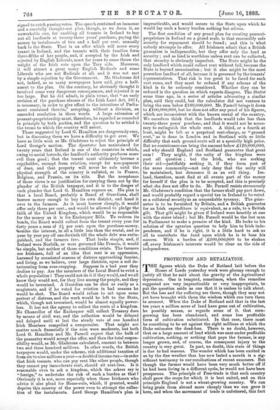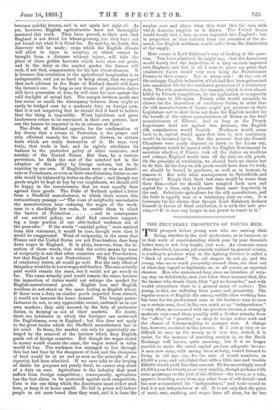PROTECTION AND RETALIATION.
THE figures which the Duke of Rutland laid before the House of Lords yesterday week were gloomy enough to justify all that he said about the gravity of the.Agricultural depression. One is tempted, sometimes, when the remedies suggested are very impracticable or very inappropriate, to put the question aside as one that it is useless to talk about. But the loss and the suffering are there, though they may not yet have brought with them the wisdom which can turn them to account. When the Duke of Rutland said that in the last ten years a million acres of land have gone out of cultivation, he possibly means, as regards some of it, that corn- growing has been abandoned, and some less profitable form of cultivation substituted. In that case, there must be something to be set against the eight millions at which the Duke estimates the dead-loss. There is no doubt, however, that on a large amount of land which was once under profitable cultivation, nothing, or nothing that pays the farmer, is any longer grown, and, -of course, the consequent injury to the country is very great. In part, no doubt, this state of things is due to bad seasons. The wonder which has been excited in us by the fine weather that has now lasted a month is a sig- nificant testimony to our recollections of recent summers. But though the farmer would have been very much better off if he had been living in a different cycle, he would not have been prosperous. The principle of Free-trade is that each country shall grow the crops for which it is best suited, and on this principle England is not a wheat-growing country. We can bring grain from abroad more cheaply than we can grow it here, and when the movement of trade is unfettered, this fact
becomes quicklyknown, and is not again lost sight of. As yet, however, English agriculturists have not thoroughly mastered this truth. They have proved, to their cost, that England is not fitted for wheat-growing, but they have not yet found out what it is fitted for. By-and-by, no doubt, this discovery will be made ; crops which the English climate will allow to ripen in security, or which cannot be brought from a distance without injury, will take the place of those golden harvests which were once our pride, and in the dairy or the market garden the farmer will seek, if not find, compensation for his lost wheat-sheaves. It is because this revolution in the agricultural imagination is so indispensable, and yet so hard to bring about, that we regret that such advisers as the Duke of Rutland should still have the farmer's ear. So long as any dreams of protective duties still have possession of him, he will close his eyes against the cold daylight of actual fact. The margin between profit and loss seems so small, the discrepancy between them might so easily be bridged over by a moderate duty on foreign corn, that it is not surprising that he should find it hard to believe that the thing is impossible. When legislators and great landowners refuse to be convinced in their own persons, how can the farmer be expected to be in advance of them ?
The 'Duke of Rutland appeals, for the confirmation of his theory that a return to Protection is the proper and only effectual remedy for the present distress, to certain facts which are really destructive of it. He says, very truly, that trade is bad, and he rightly attributes its badness to the protective policy of other countries, and notably of the United States. But then, by a curious perversion, he finds the seat of the mischief not in the adoption of this policy by foreign nations, but in its rejection by our own. If Englishmen were as wise as Ameri- cans or Frenchmen, or even as their own Colonists, duties on one side would be balanced by duties on the other ; and though our goods might be kept at bay by-our neighbours, we should still be happy in the consciousness that we were equally dour against their goods. The Duke of Rutland quoted a letter from a Sheffield manufacturer, in which there occurs this extraordinary passage :—" The want of recilfrocity necessitates the manufacturers here reducing the wages of the work- man to a shockingly low scale, to enable them to climb the barrier of - Protection and in consequence of our suicidal policy, we shall find ourselves support-
ing a large portion of our able-bodied workmen out of the poor-rate." If the words " suicidal policy ".were omitted
from this statement, it would be true, though even then it would be exaggerated. Want of reciprocity, in the sense that France and the United States are not Free-traders, does keep down wages in England. It is plain, however, from the in- sertion of these words, that what the writer means by want of reciprocity is not that other countries are not Free-traders, but that England is not Protectionist. With the imposition of retaliatory duties, all would go well. But the only effect of this policy would be to lower wages still further. The sum actually paid would remain the same, but it would not go nearly so far. The sums actually paid would remain the same, because the imposition of duties would not enlarge the market- for English-manufactured goods. English iron and • English woollens do not stand on the same footing as English wheat. If there were a duty on similar goods imported from abroad, it would not increase the home demand. The foreign manu- facturers do not, to any appreciable extent, undersell us in our own markets ; they only succeed, by the help of protective duties, in keeping us out of their markets. No doubt,
there are industries in which the foreigner can under-sell the Englishman, even in England ; but this does not apply to the great trades which the Sheffield manufacturer, has in
his mind. In them, the market can only be appreciably en- larged by the removal of the barriers which keep English goods out of foreign countries. But though the wages stated in money would remain the same, the wages stated in value would be less. The workman has managed to live through this last bad time by the cheapness of food, and the cheapness of food would be at an end as soon as the principle of re- ciprocity had been admitted. If we once take to the levying of ditties for purposes not purely fiscal, we cannot stop short of a duty on corn. Agriculture is the industry that most suffers from foreign competition ; consequently, agriculture has the best claim to be protected against such competition. Corn is the one thing which the Americans must either send here, or keep it at home unsold. No fall in prices will induce people to eat more bread than they want, and it is from the surplus over and above what they want that the corn with which America supplies us is drawn. The United States- would keenly feel a duty on corn imported into England ; but. in proportion as they suffered from the cessation of the de- mand, the English workman would suffer from the diminution, of the supply.
Here comes in Lord Salisbury's way of looking at the ques- tion. You have admitted,' he might say, that the Americans would keenly feel the imposition of a duty on corn imported into England, and this is all I want to prove my point that retaliatory duties would very soon bring the Protectionist Powers to their senses.' But at whose cost ? At the cost of the unhappy English industries, which had first been galvanised into unnatural life by the incidental protection of a retaliatory duty. The silk manufacture, for example, which is now almost killed by French competition, by the application of reciprocity would come to life again. French silks would naturally be chosen for the imposition of retaliatory duties, in order that the silk manufacturers of Lyons might put pressure on their Legislature not to shut them out from the English market for the benefit of the cotton manufacturers of Rouen or the wool manufacturers of Elbeeuf. And so long as the French Legislature held out against this pressure, the English silk manufacture would flourish. Workmen would come back to it, capital would again flow into it, new machinery would be invented for it. But the moment that the French Chambers were really disposed to listen to the Lyons cry, negotiations would be opened with the English Government to ascertain whether, if France took off the duties on woollens and cottons, England would take off the duty on silk goods. On the principle of retaliation, we should have no choice but to do this. As the duty on silk goods would have done its work, we should be bound in prudence, as well as in honour, to remove it. But with what consequences to Spitalfields and Coventry ? Simply that their last state would be worse than their first,—that we should have tempted back men and capital for a time, only to alienate them more hopelessly in the end. . Substitute agriculture for the silk manufacture, and the fable is equally true of a retaliatory duty on corn. It is fortunate for his clients that though Lord Salisbury declares himself in favour of fiscal retaliation, it is with the safe pro- viso,—" If it were any longer in our power to resort to it."



































 Previous page
Previous page